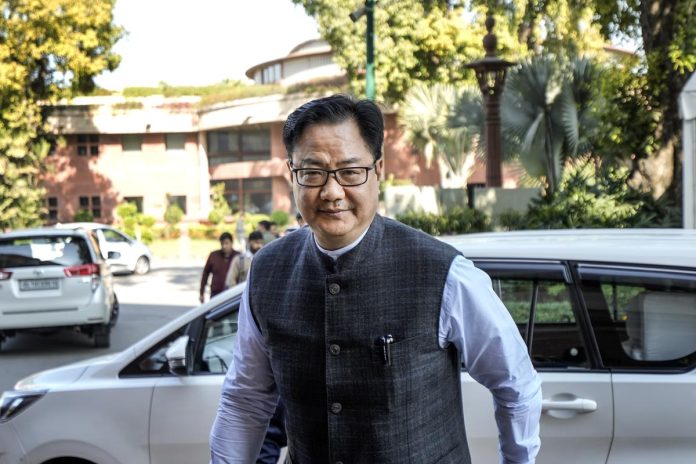- As you are aware, the Union Law Ministry is a very significant branch of the central government. It is expected of it to not only maintain a cordial relationship with the higher judiciary but also play a proactive role in making sure that judicial reforms are carried out for the benefit of the general populace. We are aware of the current state of the nation’s justice delivery system, where millions of cases are awaiting trials and millions of people are incarcerated awaiting trial. The nation’s crippling court backlog is passionately discussed at every gathering, but it gradually falls off the agenda when no real steps are taken to close the gaping hole. In the end, this results in the executive, the legislature, and the judiciary blaming one another.

PC: OpIndia Staff
- The earlier law minister and the higher judiciary always seemed to be at odds with each other and on a collision course, according to those who closely followed the topic. There was a perception that the Constitution’s two branches were working against each other rather than working together to address the issues at hand. Of course, the competing perspectives on the NJAC and the collegium system were the source of disagreement. Arjun Ram Meghwal recently replaced Kiren Rijiju as India’s minister of law after Rijiju was transferred to the Ministry of earth sciences in an intriguing move. Meghwal will have independent responsibility for law, legislative affairs, and culture. His predecessor held cabinet rank.
- The incoming law minister Meghwal has an opportunity to cool things off between the executive and judicial branches. Importantly, the shift occurs as India approaches a protracted election cycle that will end with the Lok Sabha elections in 2024 and includes state elections in Meghwal’s native Rajasthan. In addition, four justices of the Supreme Court will retire in early July. The working strength of the supreme court will drop to 28 when its maximum size is 34 if the two proposals issued by the collegium this week are not thoroughly reviewed by the end of July. Of course, there has never been a good working relationship between the political executive and the court. Indeed, the democratic ideal of the separation of powers can occasionally lead to tense interactions.
 PC: PTI
PC: PTI
- Unfortunately, it is uncommon for it to play out in the public eye to the extent that it did when Rijiju was in charge. Meghwal has a tough job ahead of him. It will be carefully observed how vacancies are filled in the supreme court and the HCs. The relationship between the government and the judiciary will be influenced by how easily it can be accomplished. To ensure that the justice delivery mechanism not only operates efficiently but also delivers properly and on schedule, it is imperative to establish a working relationship that is at least cordial. However, the costs of the conflict between the judiciary and executive fall on the plaintiffs. It is necessary to alter public perceptions of a failing judicial delivery system. Meghwal ought to guarantee this.






